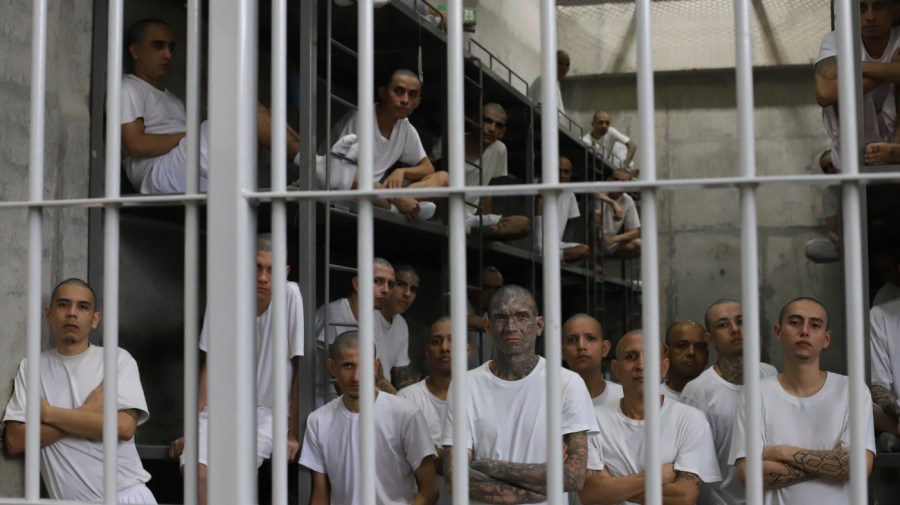
El Salvador’s president, Nayib Bukele, has offered to house in Salvadoran prisons U.S.-deported immigrants of any nationality — even U.S. citizens with criminal convictions. The offer is a recipe for violence and abuse that the U.S. should unequivocally reject.
Detainees in El Salvador’s prison system are cut off from the outside world and denied any meaningful legal recourse. While Bukele publicizes his prisons as “the best in the world,” the reality is very different. We have interviewed people released from these prisons and dozens who have relatives in jail. One after the other, we received and verified accounts of dismal detention conditions, torture and death.
One of the people we spoke with was an 18-year-old construction worker who said that police beat prison newcomers with batons for an hour. He said that when he denied being a gang member, they sent him to a dark basement cell with 320 detainees, where prison guards and other detainees beat him every day. One guard beat him so severely once, he said, that it broke a rib.
He said the cell was so crowded that detainees had to sleep on the floor or standing, an allegation we hear frequently, in a prison system where 108,000 detainees — 1.7 percent of El Salvador’s population — are crammed into spaces meant for 70,000. The U.S. State Department itself has described these conditions as “life-threatening.”
Like many others, the former detainee said that prisons were filthy and disease-ridden. While the Salvadoran government has denied Human Rights Watch access to their prisons, doctors who visited detention sites told us that tuberculosis, fungal infections, scabies, severe malnutrition and chronic digestive issues were common.
Sending people into such conditions would not only make the U.S. government complicit in violations of human rights, it would also repeat past mistakes. MS13 and Barrio 18, the brutal gangs that until recently terrorized neighborhoods across El Salvador, were born in part from deportations by the U.S. and from El Salvador’s harsh law enforcement practices. Deportations from the U.S. in the 1990s, during the Clinton administration, allowed these gangs to expand.
Mass arrests in the 2000s, which the Salvadoran government characterized as a way to curb the gangs, instead gave gang leaders the time and proximity to strengthen their internal structures in prison and a dehumanized population to recruit from. More U.S. deportations to El Salvador during the 2000s built upon this rotten foundation. Salvadoran authorities often assumed that people deported from the U.S. were members of criminal organizations and subjected many to arrests, torture, beatings, sexual assault, disappearances and killings.
After the 18-year-old man we interviewed spent months in pre-trial detention, a judge acquitted him, saying there was no evidence linking him to gangs. He still faces long-lasting consequences of the abuses he faced in jail, but many others were even less fortunate.
Local human rights groups report that almost 350 people have died in El Salvador’s prisons since Bukele began his “war on gangs” in early 2022. While Salvadoran authorities allege that the state played no part in these deaths, photos and testimony we identified and analysis by forensic experts point to a government role in several deaths.
Many relatives of people detained told us that they don’t know what their loved ones are being accused of, or even whether they are alive or dead. They are often denied legal recourse; many are only presented before a judge in mass virtual hearings — some with 300 others accused.
While Bukele publicizes his law enforcement, the truth is that his administration has consistently and drastically undermined the rule of law in El Salvador. The government openly intimidates judges who release people detained without evidence. The Legislative Assembly, now controlled by Bukele’s party, has suspended fundamental due process rights for almost three years.
Recently, the legislature amended the Constitution in ways that allow them to reform constitutional provisions — for example, to strip rights or procedural safeguards — virtually overnight.
Authorities haven’t even gone through the effort of sentencing those detained. Save for a handful of cases (most of them involving children), people detained during the war on gangs in El Salvador are awaiting trial, often on vaguely defined crimes — a move that both undermines their right to due process and denies justice to the victims of gang atrocities.
Instead of pushing forward with rights-abusive deal making, the Trump administration should work with El Salvador’s government to develop a system of public safety that is built on respect for human rights and addressing structural causes of violence. This includes investing in crime prevention, ensuring detainees are released if there is no credible evidence that they committed a crime, and holding high-level gang leaders accountable.
Without such changes, U.S. policies risk perpetuating a cycle of violence and abuse that has for decades undermined the rights of Salvadorans and prompted migration to the U.S.
Juanita Goebertus is the Americas director at Human Rights Watch.












